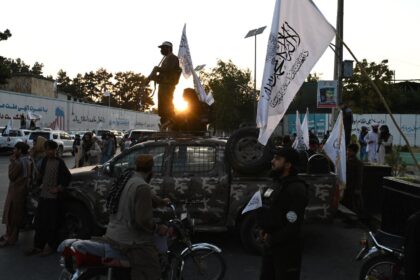RASC News Agency: While the people of Afghanistan grapple with rampant hunger, staggering unemployment, and crushing poverty, Taliban commanders are actively seeking to expand their military arsenal through foreign weapons deals. Instead of providing food, safety, and basic services to a population in distress, the group’s top military figures are investing time and resources into acquiring sophisticated arms tools that will almost certainly be used to entrench their authoritarian rule rather than defend the nation. Credible sources confirm that in March of last year, Qari Fasihuddin Fitrat, the Taliban’s Chief of Army Staff, accompanied by Mullah Yaqoob Mujahid, the group’s Defense Minister, traveled to Doha, Qatar, to attend an international arms exhibition. Ostensibly a diplomatic visit, the trip was in reality a calculated attempt to showcase power and secure military backing from regional allies. It was a display not of governance, but of growing militarization by a regime increasingly dependent on coercion rather than consent.
The timing of this visit was particularly appalling. At that very moment, millions of Afghanistanis were battling sub-zero temperatures without shelter, heating, or sufficient food supplies. Yet Taliban leaders unmoved by the suffering of their people participated in ceremonial meetings with Qatari officials and heaped praise on the country’s role in brokering the 2020 Doha Agreement. That agreement, intended to foster peace, instead paved the way for the Taliban’s seizure of power and the systematic dismantling of Afghanistan’s democratic institutions, media freedoms, and civil society. Since assuming control, the Taliban have wielded the agreement as a mandate for repression. The group’s military elite, particularly figures like Qari Fasihuddin infamously dubbed “The Conqueror of the North”—have been linked to widespread atrocities, including extrajudicial killings, forced displacements, and targeted crackdowns in regions such as Panjshir and Andarab. Yet recent intelligence suggests that even senior non-Pashtun Taliban commanders are now viewed with suspicion and increasingly marginalized. Sources close to the Taliban’s leadership say Fasihuddin, despite his rank, has been repeatedly excluded from high-level decision-making and is under constant internal surveillance clear evidence of the group’s ethnic hierarchy and deep-seated tribalism.
In Doha, Taliban representatives reportedly expressed interest in procuring air defense systems and other advanced weaponry, claiming these purchases were necessary for national security. However, the past three years have shown that Taliban arms acquisitions are rarely about protecting the country. Instead, such weapons are routinely used to suppress dissent, intimidate journalists, persecute ethnic minorities, and brutally enforce regressive edicts against women and girls. The role of Qatar in facilitating Taliban access to international arms markets has raised pressing ethical and political questions. How can a state that positions itself as a global peace broker simultaneously offer a platform for a theocratic regime known for its brutality and gender apartheid? Such contradictions are becoming increasingly difficult for the international community to ignore. Each deal brokered under diplomatic cover strengthens a regime that silences its people with bullets rather than serving them with dignity.
Moreover, the symbolism of the Taliban’s participation in international arms expos underscores a disturbing truth: the group seeks not legitimacy through reform, but dominance through militarization. Their vision for Afghanistan is not one of inclusive governance but of enforced submission, in which power flows from the barrel of a gun and justice is rendered by edict, not law. The international community must come to terms with a hard reality: indirect engagement and passive tolerance of the Taliban’s actions are no longer neutral stances they are complicity. Continued accommodation enables a regime that thrives on fear and repression.
If the world is sincere in its commitment to peace, justice, and human rights, it must stop treating the Taliban as a conventional governing entity. Instead, it must hold them accountable for their crimes, investigate the misuse of military equipment, and challenge the regional actors facilitating their militarization. Afghanistan’s future cannot be built on guns and intimidation. The Afghanistani people need food, freedom, and a future rooted in equality not the cold grip of a militarized theocracy. The weapons being paraded in Doha today will not defend a nation; they will tighten the chains around its people tomorrow.






